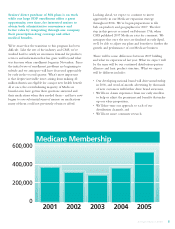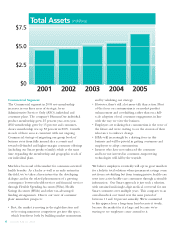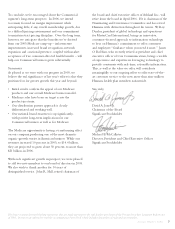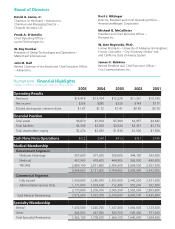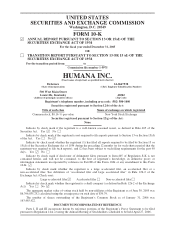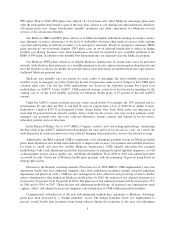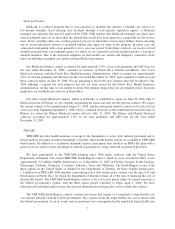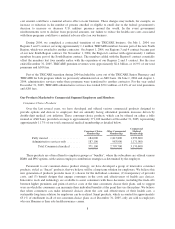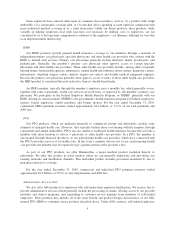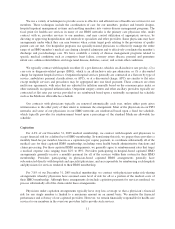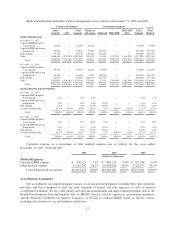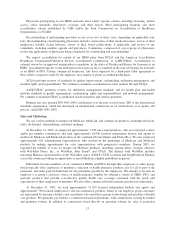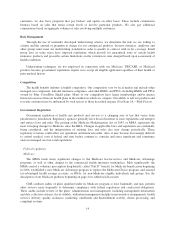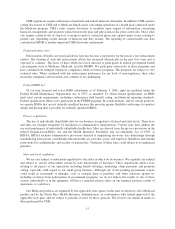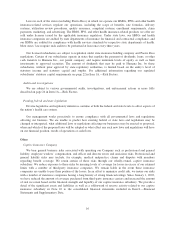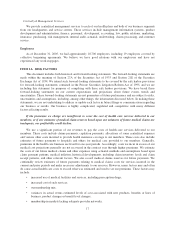Humana 2005 Annual Report Download - page 17
Download and view the complete annual report
Please find page 17 of the 2005 Humana annual report below. You can navigate through the pages in the report by either clicking on the pages listed below, or by using the keyword search tool below to find specific information within the annual report.Medicaid Product
Medicaid is a federal program that is state-operated to facilitate the delivery of health care services to
low-income residents. Each electing state develops, through a state specific regulatory agency, a Medicaid
managed care initiative that must be approved by CMS. CMS requires that Medicaid managed care plans meet
federal standards and cost no more than the amount that would have been spent on a comparable fee-for-service
basis. States currently either use a formal proposal process in which they review many bidders before selecting
one or award individual contracts to qualified bidders who apply for entry to the program. In either case, the
contractual relationship with a state generally is for a one-year period. Under these contracts, we receive a fixed
monthly payment from a government agency for which we are required to provide health insurance coverage to
enrolled members. Due to the increased emphasis on state health care reform and budgetary constraints, more
states are utilizing a managed care product in their Medicaid programs.
Our Medicaid business, which accounted for approximately 3.8% of our total premiums and ASO fees for
the year ended December 31, 2005, consisted of contracts in Puerto Rico, Florida and Illinois. Our 3-year
Medicaid contracts with the Puerto Rico Health Insurance Administration, which accounted for approximately
2.8% of our total premium and ASO fees for the year ended December 31, 2005, were extended a fourth year and
these contracts expire on June 30, 2006. We are preparing to bid on the new contracts that will be effective July
2006 although a request for such proposal has not yet been issued by the Puerto Rico Health Insurance
Administration. At this time we are unable to predict the ultimate impact that any government policy decisions
might have on our Medicaid contracts in Puerto Rico.
Our other current Medicaid contract, which is in Florida, is scheduled to expire on June 30, 2006. Due to
Medicaid reform in Florida, we are currently negotiating the terms and rates for the renewal contract. We expect
the current contract to be extended until August 31, 2006, and the subsequent renewal contract to be effective for
a two-year term beginning September 1, 2006. Due to continual decreases in the reimbursement from the state of
Illinois, we exited the Illinois Medicaid market effective July 31, 2005. The Illinois and Florida Medicaid
contracts accounted for approximately 1.0% of our total premiums and ASO fees for the year ended
December 31, 2005.
TRICARE
TRICARE provides health insurance coverage to the dependents of active duty military personnel and to
retired military personnel and their dependents. Currently, three health benefit options are available to TRICARE
beneficiaries. In addition to a traditional indemnity option, participants may enroll in an HMO-like plan with a
point-of-service option or take advantage of reduced copayments by using a network of preferred providers.
We have participated in the TRICARE program since 1996 under contracts with the United States
Department of Defense. Our current TRICARE South Region contract, which we were awarded in 2003, covers
approximately 2.9 million eligible beneficiaries as of December 31, 2005 in Florida, Georgia, South Carolina,
Mississippi, Alabama, Tennessee, Louisiana, Arkansas, Texas and Oklahoma. The South Region is one of the
three regions in the United States as defined by the Department of Defense. Of these eligible beneficiaries,
1.1 million were TRICARE ASO members representing active duty beneficiaries, seniors over the age of 65 and
beneficiaries in Puerto Rico for which the Department of Defense retains all of the risk of financing the cost of
their health benefit. The TRICARE South Region contract is for a five-year period subject to annual renewals at
the federal government’s option, with the third option period scheduled to begin April 1, 2006. We have
subcontracted with third parties to provide selected administration and specialty services under the contract.
The TRICARE South Region contract contains provisions that require us to negotiate a target health care
cost amount annually with the federal government. Any variance from the target health care cost is shared with
the federal government. As such, events and circumstances not contemplated in the negotiated target health care
7


